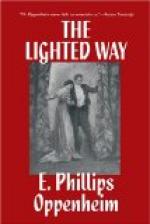“I am pleased to meet you again, Mr. Chetwode,” he said, “the more pleased because I understand from my sister that we are to have the pleasure of your company for luncheon.”
“You are very kind,” Arnold murmured.
“Mr. Starling—I believe that you met the other night,” Count Sabatini continued.
Arnold held out his hand but could scarcely repress a start. Starling seemed to have lost weight. His cheeks were almost cadaverous, his eyes hollow. His slight arrogance of bearing had gone; he gave one a most unpleasant impression.
“I remember Mr. Starling quite well,” Arnold said. “We met also, I think, at the Milan Hotel, a few minutes after the murder of Mr. Rosario.”
Starling shook hands limply. Sabatini smiled.
“A memorable occasion,” he remarked. “Let us take luncheon now. Gustave,” he added, turning to the waiter who had just entered the room, “serve the luncheon at once. It is a queer little place, this, Mr. Chetwode,” he went on, turning to Arnold, “but I can promise you that the omelette, at least, is as served in my own country.”
They took their places at the table, and Arnold, at any rate, found it a very pleasant party. Sabatini was no longer gloomy and taciturn. His manner still retained a little of its deliberation, but towards Arnold especially he was more than courteous. He seemed, indeed, to have the desire to attract. Fenella was almost bewitching. She had recovered her spirits, and she talked to him often in a half audible undertone, the familiarity of which gave him a curious pleasure. Starling alone was silent and depressed. He drank a good deal, but ate scarcely anything. Every passing footstep upon the stairs outside alarmed him; every time voices were heard he stopped to listen. Sabatini glanced towards him once with a scornful flash in his black eyes.
“One would imagine, my dear Starling, that you had committed a crime!” he exclaimed.
Starling raised his glass to his lips with shaking fingers, and drained its contents.
“I had too much champagne last night,” he muttered.
There was a moment’s silence. Every one felt his statement to be a lie. For some reason or other, the man was afraid. Arnold was conscious of a sense of apprehension stealing over him. The touch of Fenella’s fingers upon his arm left him, for a moment, cold. Sabatini turned his head slowly towards the speaker, and his face had become like the face of an inquisitor, stern and merciless, with the flavor of death in the cold, mirthless parting of the lips.
“Then you drank a very bad brand, my friend,” he declared. “Still, even then, the worst champagne in the world should not give you those ugly lines under the eyes, the scared appearance of a hunted rabbit. One would imagine—”
Starling struck the table a blow with his fist which set the glasses jingling.
“D—n it, stop, Sabatini!” he exclaimed. “Do you want to—”




